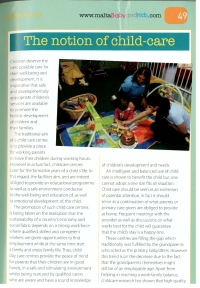
Children deserve the best possible care for their well-being and development. It is imperative that safe and developmentally appropriate children's services are available to promote the holistic development of children and their families.
The traditional aim of a child care centre is to provide a place for working parents to leave their children during working hours. However in actual fact, childcare centres cater for the formative years of a child s' life. In this regard, the facilities aim, and are indeed obliged to provide an educational programme as well as a safe environment conducive to the well-being and education of, as well as emotional development of, the child.
The promotion of such child care centres is being taken on the realisation that the sustainability of a country's economy and social fabric depends on a strong work force where qualified, skilled and competent workers are given opportunities to find employment while at the same time start a family and enjoy family life. Thus, child day care centres provide the peace of mind for parents that their children are in good hands, in a safe and stimulating environment whilst being nurtured by qualified carers who are aware and have a sound knowledge of children's development and needs.
An intelligent and balanced use of child care is shown to benefit the child but one cannot adopt a one size fits all situation. Child care should be seen as an extension of parental attention, in fact it should serve as a continuation of what parents or primary care givers are obliged to provide at home. Frequent meetings with the provider as well as discussions on what works best for the child will guarantee that the child's stay is a happy one.
These centres are filling the gap which traditionally was fulfilled by the grandparents who acted as the primary babysitters. However this trend is on the decrease due to the fact that the grandparents themselves might still be of an employable age. Apart from helping in reaching a work-family balance, childcare research has shown that high quality care can impact positively upon children's intellectual, linguistic and social skills.
As with any other service, child care needs to be regulated and monitored to ensure that the set standards are upheld. The Welfare Services Assessment Unit (WSAU) within the Department of Social Welfare Standards has been entrusted with the inspectorate role. In fact the WSAU inspects, monitors and assesses child day care services. The centres are expected to apply for registration with the Department which provides the necessary guidance. This registration procedure is intended to reassure parents who choose Registered Child Day Care Facilities for their children that the facility is striving to operate according to a set of established standards in the best interest of their children.
In Malta, the publication of the National Standards for Child Care Facilities in 2006 was intended to ensure a better, safer and healthier environment for children. Prior to 2006, childcare provisions were not regulated, thus, the purpose of regulation and the setting of standards for this particular sector provides quality assurance for children attending such facilities and reassurance for their parents.
The level rating for the qualifications and the occupational standards for child carers and managers relates to another very positive recent development. This was launched by the Ministry for Justice, Dialogue and the Family together with the Ministry for Education and Employment so as to ensure that qualified persons are working within the centres as required by the 2006 National Standards. One can appreciate that the well-being of children cannot be left to chance and although the providers do have a leeway in the way they operate the facility, it must be kept in mind at all times that such services are being given for the benefit of the ultimate beneficiaries, that is, the children.
Currently, there are 67 registered facilities, 47 of which are privately owned, 4 are run by the Church, 7 which are public-private partnerships and 9 Foundation for Educational services (FES) centres provided by the government which also provides means testing and thus caters for families with low incomes. The notable increase in registered child care centres reflects the demand for such centres as well as the measures taken in order to meet these demands. With this objective in sight, national funds as well as European Regional Development Funds (ERDF) have been made available to these child care centres to improve their services as well as encourage new ones to start operating.
Government's commitment is to promote a view of childhood as an important phase of life in its own right and not just as preparation for adult life. Children must be allowed to live in the present and to realise their full potential. These are the aims underlining the National Children's Policy which shall be launched shortly by the Ministry of Justice, Dialogue and the Family. The objectives outlined centre around the child as the holder of rights, and a subject liable to vulnerability. Ultimate success can be realised if children themselves feel the positive change.
Dr. Sandra Hili Vassallo – Director DSWS
